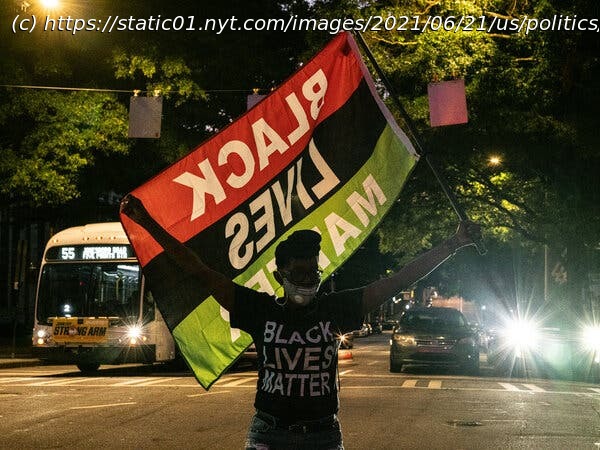Tech companies talk a big game about racial equity. But inside their offices it’s a different story.
Since President Biden signed a law last week making Juneteenth a federal holiday, there has been no shortage of corporate displays of good will. Google devoted its famous “doodle” to the holiday, and many companies have declared that they will observe Juneteenth as a paid holiday. With Republicans in state governments across the country introducing bills and passing laws that try to limit the teaching of racism’s role in American history, tech firms and other major corporations have joined Democrats in condemning them. But what’s actually going on inside these companies? A report released last week by the Conference Board, a corporate research firm and business group, showed that while conversations about confronting race and racism might be on the rise, actual workplace equity isn’t. The wage gap along racial lines is increasing, particularly “in industries, occupations and locations where the fastest growth in high-paying jobs is taking place,” the report’s authors found. Chief among those industries, they wrote, is Big Tech. The gap in earnings has widened over the past decade: Black men with bachelor’s degrees earned 24 percent less than degree-holding white men in 2019 — a marked decline from 2010, when the wage deficit was 18 percent. For Black women, the difference in wages with white men was 26 percent — also significantly worse than the number from 2010. Big Tech has contributed heavily to the trend: While Black people make up 13 percent of the U.S. labor force, just 4 percent of top earners in the tech sector were Black in 2019, less than the already low 6 percent in other industries. At Google, Black employees made up only 4 percent of the work force last year. Though the tech sector has produced many millionaires over the past decade, relatively few have been Black. “If you look at the percent of Black workers in the tech industry, their share has not grown,” Gad Levanon, the founder of the Labor Market Institute at the Conference Board and the lead author of the report, said in an interview. “If anything, it is shrinking.” A separate study last year by RateMyInvestor examined nearly 10,000 tech entrepreneurs and 135 venture capital firms. It found that among founders of tech projects who had received venture funding, just 1 percent were Black. While tech firms have taken steps toward increasing transparency on racial inequities in their workforces, particularly since the spike in Black Lives Matter organizing in 2014, they have taken few tangible steps to fix the problem, said Y-Vonne Hutchinson, a workplace diversity expert and the founder of the diversity and inclusion firm ReadySet.






